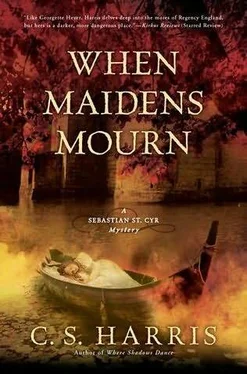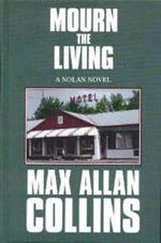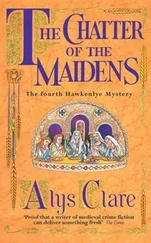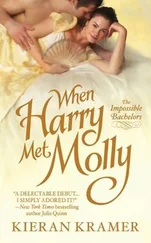C Harris - When maidens mourn
Здесь есть возможность читать онлайн «C Harris - When maidens mourn» весь текст электронной книги совершенно бесплатно (целиком полную версию без сокращений). В некоторых случаях можно слушать аудио, скачать через торрент в формате fb2 и присутствует краткое содержание. Жанр: Классический детектив, на английском языке. Описание произведения, (предисловие) а так же отзывы посетителей доступны на портале библиотеки ЛибКат.
- Название:When maidens mourn
- Автор:
- Жанр:
- Год:неизвестен
- ISBN:нет данных
- Рейтинг книги:5 / 5. Голосов: 1
-
Избранное:Добавить в избранное
- Отзывы:
-
Ваша оценка:
- 100
- 1
- 2
- 3
- 4
- 5
When maidens mourn: краткое содержание, описание и аннотация
Предлагаем к чтению аннотацию, описание, краткое содержание или предисловие (зависит от того, что написал сам автор книги «When maidens mourn»). Если вы не нашли необходимую информацию о книге — напишите в комментариях, мы постараемся отыскать её.
When maidens mourn — читать онлайн бесплатно полную книгу (весь текст) целиком
Ниже представлен текст книги, разбитый по страницам. Система сохранения места последней прочитанной страницы, позволяет с удобством читать онлайн бесплатно книгу «When maidens mourn», без необходимости каждый раз заново искать на чём Вы остановились. Поставьте закладку, и сможете в любой момент перейти на страницу, на которой закончили чтение.
Интервал:
Закладка:
Sebastian leaned against the stone jamb of the gateway. He had one hand in his pocket, where a small double-barreled pistol, primed and loaded, partially spoiled the line of his fashionable coat. A sheath in his boot concealed the dagger he was rarely without. He waited until the man had crossed to the cart, then said, `Mr. Jamie Knox?'
The man froze with his hands grasping a cask, his head turning toward the sound of Sebastian's voice. He appeared wary but not surprised, and it occurred to Sebastian that the comely young woman behind the bar must have run to warn her master to expect a visitor. `Aye. And who might ye be?'
`Devlin. Lord Devlin.'
The man sniffed. Somewhere in his mid-thirties, he had a compact, muscular body that belied the heavy sprinkling of gray in this thick, curly head of hair. Far from being dressed all in black, he wore buff-colored trousers and a brown coat that looked in serious need of a good brushing and mending. His face was broad and sun darkened, with a long scar that ran down one cheek. Sebastian had seen scars like that before, left by a saber slash.
The man paused for only an instant. Then he hefted the hogshead and headed back to the stairs. `I'm a busy man. What ye want?'
The accent surprised Sebastian; it was West Country rather than London or Middlesex. He said, `I understand you knew a woman named Miss Tennyson.'
The man grunted. `Met her. Came sniffin' around here a while back, she did, prattlin' about Roman walls and pictures made of little colored bits and a bunch of other nonsense. Why ye ask?'
`She's dead.'
`Aye. So we heard.' The man disappeared down the cellar steps.
Sebastian waited until he reemerged. `When was the last time you saw her?'
`I told ye, 'twere a while back. Two, maybe three months ago.'
`That's curious. You see, someone saw you speaking to her just a few days ago. Last Thursday, to be precise. At the York Steps.'
The man grasped another hogshead and turned back toward the cellar. `Who'er told ye that didn't know what he was talkin' about.'
`It's possible, I suppose.'
The man grunted and started down the steep stairs again. He was breathing heavily by the time he came back up. He paused to lean against the cellar door and swipe his sweaty forehead against the shoulder of his coat.
`You were a soldier?' said Sebastian.
`What makes ye think that?'
`It left you with a rather distinctive face.'
The man pushed away from the cellar. `I was here all day Thursday. Ask any o' the lads in the public room; they'll tell ye. Ye gonna call 'em all liars?'
Sebastian said, `I'm told Jamie Knox has yellow eyes. So why are yours brown?'
The man gave a startled laugh. `It's dark. Ye can't see what color a man's eyes are in the dark.'
`I can.'
`Huh.' The tavern owner sniffed. `They only say that about me eyes because of the sign. Ye did see the sign, didn't ye? They also like t'say I only wear black. Next thing ye know, they'll be whisperin' that I've got a tail tucked into me breeches.'
Sebastian let his gaze drift around the ancient yard. The massive flint and tile rampart that ran along the side of the court was distinctly different from the wall that separated the yard from the burial ground at its rear. No more than seven feet high and topped by a row of iron spikes designed to discourage body snatchers, that part of the wall lay deep in the heavy shadows cast by the sprawling limbs of the graveyard's leafy elms. And in the fork of one of those trees crouched a lean man dressed all in black except for the white of his shirt. He balanced there easily, the stock of his rifle resting against his thigh.
To anyone else, the rifleman would have been invisible.
Sebastian said, `When he comes down out of his tree, tell Mr. Knox he can either talk to me, or he can talk to Bow Street. I suppose his choice will depend on exactly what's in his cellars.'
The stocky man's scarred face split into a nasty grin.
`I don't need to tell him. He can hear ye. Has the eyes and ears of a cat, he does.'
Sebastian turned toward the gateway. The stocky man put out a hand to stop him.
Sebastian stared pointedly at the grimy fingers clenching his sleeve. The hand was withdrawn.
The man licked his lower lip. `He could've shot out both yer eyes from where he's sittin. And I'll tell ye somethin' else: He looks enough like ye t'be yer brother. Ye think about that. Ye think about that real hard.' He paused a moment, then added mockingly, `Me lord.'
Chapter 16
Sebastian walked down Cheapside, his hands thrust deep into the pockets of his coat, the hot wind eddying the flames of the streetlamps to send leaping shadows over the shuttered shop fronts and dusty, rubbish-strewn cobbles.
Once, he had been the youngest of three brothers, the fourth child born to the Earl of Hendon and his beautiful, vivacious countess, Sophie. If there had ever been a time in his parents marriage that was pleasant, Sebastian couldn't remember it. They had lived essentially separate lives, the Earl devoting himself to affairs of state while the Countess lost herself in a gay whirl of balls and routs and visits to country houses. The few occasions when husband and wife came together had been characterized by stony silences punctuated all too often with stormy bouts of tears and voices raised in anger.
Yet Sebastian's childhood had not been an entirely unhappy one. In his memories, Sophie's touch was always soft and loving, and her laughter when her husband was not around came frequently. Her four children had never doubted her love for them. Though unlike each other in many ways and separated in age, the three brothers had been unusually close. Only Amanda, the eldest child, had held herself aloof. Sometimes I think Amanda was born angry with the world, Sophie had once said, her thoughtful, worried gaze following her daughter when Amanda stormed off from a game of battledore and shuttlecock.
It would be years before Sebastian understood the true source of Amanda's anger.
He paused to look out over the gray, sunken tombs and rank nettles choking St. Paul's churchyard, his thoughts still lost in the past.
In contrast to his gay, demonstrative wife, the Earl of Hendon had been a stern, demanding father preoccupied with affairs of state. But he'd still found the time to teach his sons to ride and shoot and fence, and he took a gruff pride in their prowess. An intensely private man, he had remained a distant figure, detached and remote especially from his youngest child, the child so unlike him in looks and temperament and talents.
Then had come a series of tragedies. Sebastian's oldest brother, Richard, was the first to die, caught in a vicious riptide while swimming off the coast of Cornwall near the Earl's principal residence. Then, one dreadful summer when the clouds of war swept across Europe and the fabric of society as they'd always known it seemed forever rent by revolution and violence, Cecil had sickened and died too.
Once the proud father of three healthy sons, Hendon found himself left with only the youngest, Sebastian. Sebastian, the son most unlike his father; the son on whom the Earl's wrath always fell the hardest, the son who had always known himself to be a disappointment in every way to the brusque, barrel-chested man with the piercingly blue St. Cyr eyes that were so noticeably lacking in his new heir.
That same summer, when Sebastian was eleven, Hendon's countess sailed away for a day's pleasure cruise, never to return. Lost at sea, they'd said. Even at the time, Sebastian hadn't believed it. For months he'd climbed the cliffs overlooking the endless choppy waters of the Channel, convinced that if she were in truth dead, he'd somehow know it; he'd feel it.
Odd, he thought now as he pushed away from the churchyard's rusted railing and turned his feet toward the noisy, brightly lit hells off St. James's Street, how he could have been so right about that and so wrong about almost everything else.
Читать дальшеИнтервал:
Закладка:
Похожие книги на «When maidens mourn»
Представляем Вашему вниманию похожие книги на «When maidens mourn» списком для выбора. Мы отобрали схожую по названию и смыслу литературу в надежде предоставить читателям больше вариантов отыскать новые, интересные, ещё непрочитанные произведения.
Обсуждение, отзывы о книге «When maidens mourn» и просто собственные мнения читателей. Оставьте ваши комментарии, напишите, что Вы думаете о произведении, его смысле или главных героях. Укажите что конкретно понравилось, а что нет, и почему Вы так считаете.












